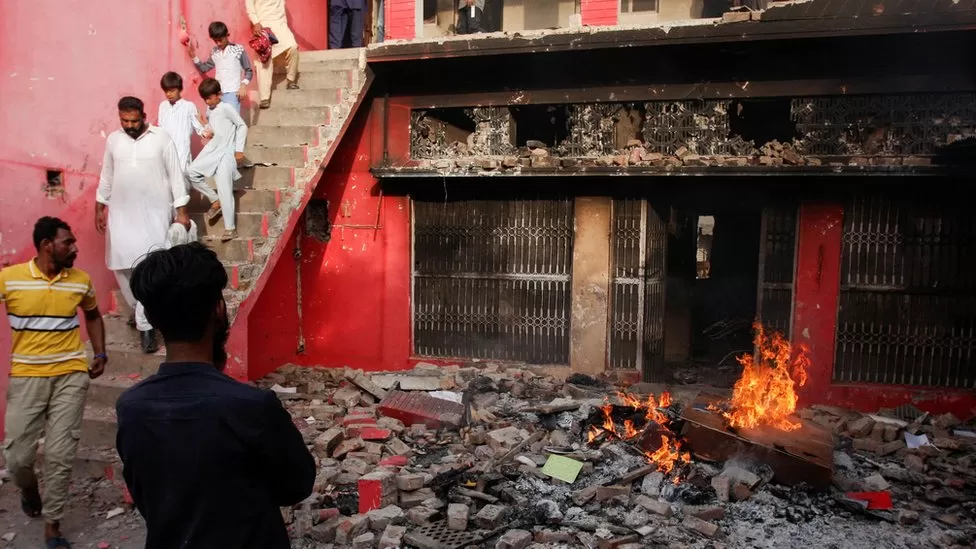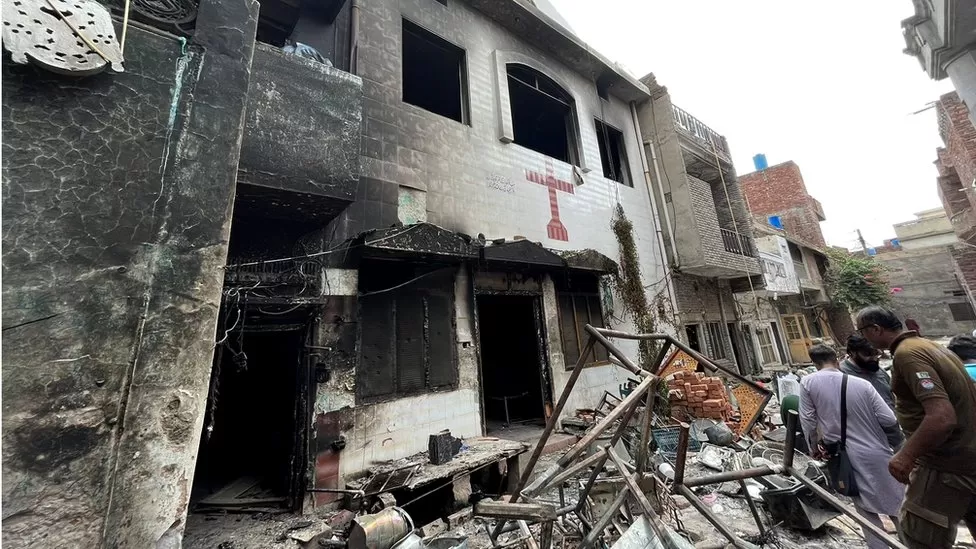More than 100 people have been arrested in a city in east Pakistan after thousands of Muslims burned churches and vandalised homes.
Violence in Jaranwala was sparked by claims that two Christian men had torn pages from a copy of the Quran. The historic Salvation Army Church was still smouldering on Thursday, one day after the riot.
Ruins have been surrounded with barbed wire as the situation remains tense in the city. Public gatherings have also been restricted for seven days in Faisalabad district, which includes Jaranwala.
The two men accused of damaging the Quran, Islam's holy book, have been charged with blasphemy, which is punishable by death in Pakistan. Even though Pakistan has yet to sentence anyone to death for blasphemy, a mere accusation can result in widespread riots, sometimes leading to lynchings and killings.
A local official told BBC Urdu that authorities had received calls about protests and fires early on Wednesday morning, after reports about the desecration of the Quran circulated in the city and on social media.
Authorities said torn pages of the sacred text with blasphemous content allegedly scribbled on them in red marker ink were found near a Christian community. The reports sparked outrage among the Muslim community, and the violence that ensued saw mobs attacking and looting private homes belonging to Christians.
Police told the BBC that possessions belonging to Christians were pulled into the streets and set on fire. Yassir Bhatti, a 31-year-old Christian, was one of those forced to flee their homes.
“They broke the windows, doors and took out fridges, sofas, chairs and other household items to pile them up in front of the Church to be burnt,” he told AFP news agency.
“They also burnt and desecrated Bibles, they were ruthless.”

Videos on social media show protesters destroying Christian buildings while police appear to watch on. Pastor Javed Bhatti, a local priest, told the BBC: “They burnt everything. They destroyed our homes, this house of God.” Another woman, called Sonam, fled with her three children just before the area was attacked.
“We just left without dressing,” she said. “We picked up our small children and just ran.”
Usman Anwar, the police chief in Punjab province, was asked by the BBC why – according to some eyewitness accounts – the police did not appear to try to stop the protestors. He said that law enforcement did not want to escalate the tension in case it led to loss of lives.
He also confirmed the arrest of over 120 people for their involvement in the unrest. Police identified them through social media videos. The police chief added that five cases have been filed against hundreds of people suspected of being responsible for the violence. More arrests are expected once the identification process is concluded.
Two years ago, a Sri Lankan man accused of blasphemy was killed by an enraged mob and had his body set on fire. In 2009, a group burned down about 60 homes and killed six people in the Gorja district in Punjab, after accusing them of insulting Islam.
Pakistan inherited the blasphemy law from the British in the 19th Century. In the 1980s, Islamabad introduced stiffer penalties, including the death sentence for insulting Islam. Around 96% of Pakistan's population is Muslim. Other countries, including Iran, Brunei, and Mauritania also impose capital punishment for insulting religion.
Religion-fuelled violence in Pakistan has risen since the country made blasphemy punishable by death, as it “bolsters violent behaviour,” Iftekharul Bashar, a researcher at the think-tank RSIS who focuses on political and religious violence in South Asia, told the BBC.
“The Pakistani society has experienced increased fragmentation, driven by widening economic disparities, leading to an upsurge in violence directed towards minority religious groups,” Mr Bashar said.
“The emergence of extremist and vigilante factions within Pakistan, some of which exhibit significant financial backing, also contributed to this trouble trend.”
Amir Mir, the information minister for Punjab province, condemned the latest alleged blasphemy and said in a statement that thousands of police had been sent to the area, with dozens of people detained. The angry group was mostly made up of people from an Islamist political party called Tehreek-e-Labbaik Pakistan (TLP), a government source told Reuters. The TLP has denied any involvement.
Caretaker PM Anwar ul-Haq Kakar called for swift action against those responsible for the violence. And Pakistani bishop Azad Marshall, in the neighbouring city of Lahore, said the Christian community was “deeply pained and distressed” by the events.
“We cry out for justice and action from law enforcement and those who dispense justice, and the safety of all citizens to intervene immediately and assure us that our lives are valuable in our own homeland,” he posted on X, formerly known as Twitter.
— CutC by bbc.com


